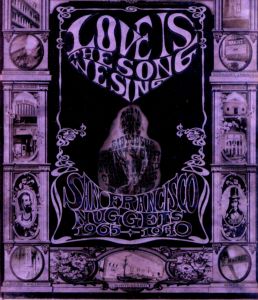
- Format: MP3

Jan 1964-Oct 1970
As the fourth Nuggets box from Rhino -- following the Children of Nuggets set, which may not count for some listeners as a true entry in the series as it documents the reverberations of Nuggets instead of the original big bang -- Love Is the Song We Sing: San Francisco Nuggets 1965-1970 is easily the most specific and idiosyncratic yet, a set devoted to a time and a place: namely the Bay Area that sowed the seeds of the Summer of Love in 1967. Released in conjunction with that 40th anniversary (although sadly missing the summer of nostalgia in 2007, reaching the stores that fall), Love Is the Song We Sing is surely a time capsule, but it may not be as much interest to those who lived through it as those who pine for the glory days of free love, hippies, and psychedelia. No less of an authority than legendary rock critic Greil Marcus noted in his Interview magazine review that many of these bands are obscure to him -- and he lived through the time, in the Bay Area, so he should know. If Marcus has a gripe, chances are the average listener looking for a heavy dose of nostalgia will also find Love Is the Song We Sing rather overwhelming in its reliance on momentary sensations and obscurities, but that's kind of the point of all the Nuggets set: to dig way deeper than the surface and find the best of its chosen subculture. Fans of Nuggets -- whether in its original double-LP Lenny Kaye incarnation or in the subsequent box sets -- know this, and that's who Love Is the Song We Sing is truly aimed at, but the odd thing is that they may not be entirely satisfied with this set either, as it deviates from the Nuggets formula in a couple of crucial ways. First, there are some genuinely huge songs by genuinely huge bands -- like Jefferson Airplane's "White Rabbit," Country Joe & the Fish's "I Feel Like I'm Fixing to Die Rag," Blue Cheer's "Summertime Blues," and Santana's "Evil Ways" -- a few more marquee names than normal (including the Grateful Dead, Steve Miller Band, Janis Joplin, Sly & the Family Stone, and Moby Grape), and bands are occasionally repeated, but the biggest musical difference is that this is a decided shift away from the wild, wooly guitar rock of the previous Nuggets, lacking both the raw garage and hard, swirling psychedelia that has been the hallmark of the series. Instead, Love Is the Song We Sing is firmly within the camp of the hippies, documenting their rise, their peak, and softly disguising their fall by ending the set in 1970, when the Summer of Love was still echoing strongly but just beginning to fade.
This set takes its time to get to 1967, as that legendary summer doesn't roll around until disc three, but the pace never seems leisurely, as the first two discs document how that summer came to be, beginning with Dino Valenti's "Let's Get Together" (which provides the chorus to the Youngbloods' "Get Together," the '60s standard that closes the set), then winds its way through a lot of folk-rock before tougher, bluesier, trippier sounds work their way into the mix toward the beginning of the second disc. Just like the hippies, Love never really abandons these folkie beginnings and that communal vibe is always present even as soul, jazz, bluegrass, blues, and avant-garde bubble toward the surface. Ultimately, it's best to view this box set as a document of the era of the hippies, a piece of pop culture anthropology that might not be perfect -- it's always possible to quibble over the featured tracks by the biggest names, or notice a missing act that should have been here (most notably the Sir Douglas Quintet, setting up shop in San Francisco while in exile from Austin) -- but there is no comparable compilation to this, no other set that has the same scope or ambition. And few other box sets succeed so well at capturing a specific moment in time, or explaining how that moment in time happened, as those first two discs do a terrific job in pulling together the disparate strands that added up to hippie culture. If there are a bunch of little-known names here, that only helps illustrate how far-reaching the movement was -- after all, if it was a limited phenomenon, could it have spawned so many bands that were forgotten? Plus, these forgotten gems are the reason why Nuggets exist, and in its CD incarnation, there has been no better psychedelic or garage series that serves the passionate record collector who nevertheless isn't quite dedicated enough to sort through all the hard-to-find reissues of quasi-legality to find the good stuff. Fortunately, the compilers of Nuggets, here led by producer Alec Palao (who also contributes excellent notes here, along with Ben Fong-Torres and Gene Sculatti), sift through these pebbles to get the gems, and then present them in logical yet loving fashion, so listening to the box is both illuminating and entertaining. It's possible to argue that this hippie-dippy music -- and make no mistake, this confirms hippie stereotypes as much as it explodes them with its far-ranging musical reach -- is the opposite of the nasty noise of the first Nuggets and perhaps there will be some unrepentant garage rockers who will sneer at this set, but it will be their loss because Love Is the Song We Sing is a remarkable historical document filled with as much great music as Nuggets, Vol. 2. And when all is said and done, it is a set that is for fans of those first three boxes, the kind of rock & roll fan who loves an exceptional guided tour through the past, instead of listeners looking for a quick dose of nostalgia.